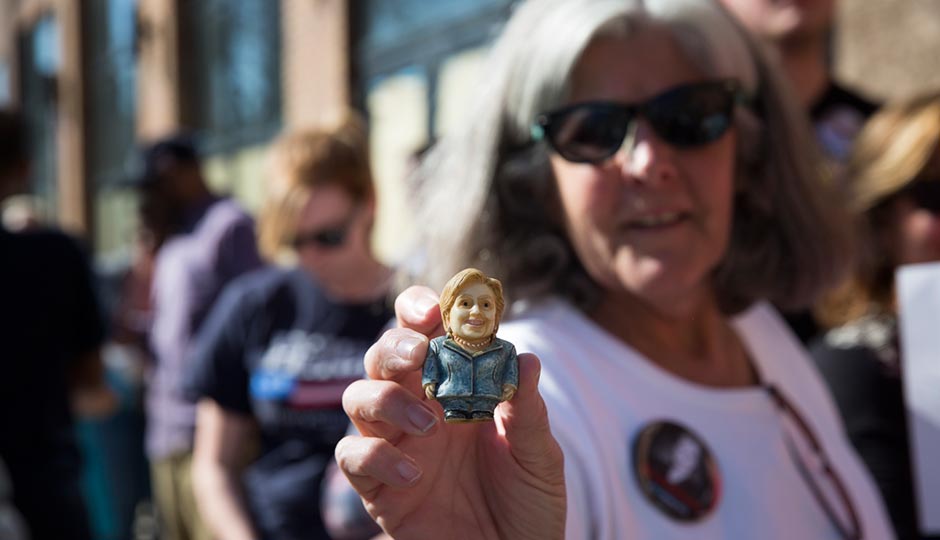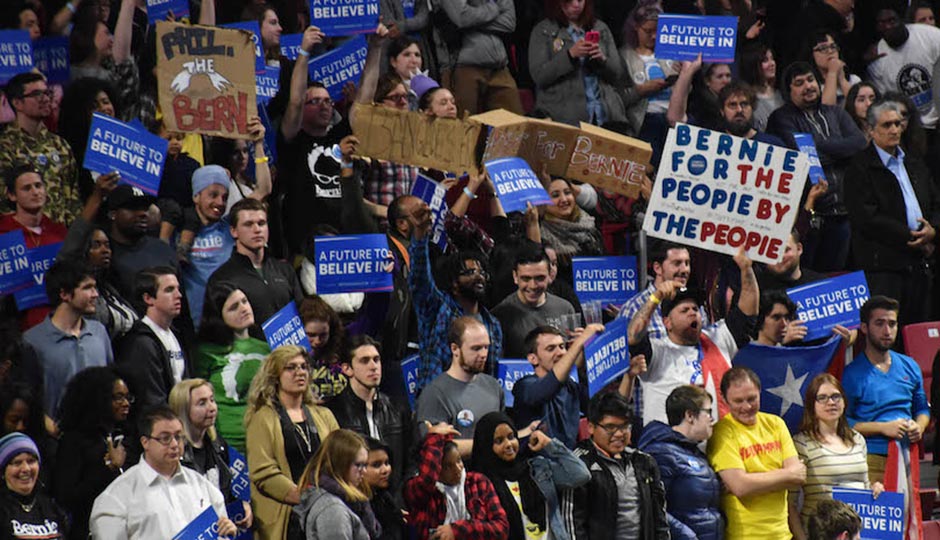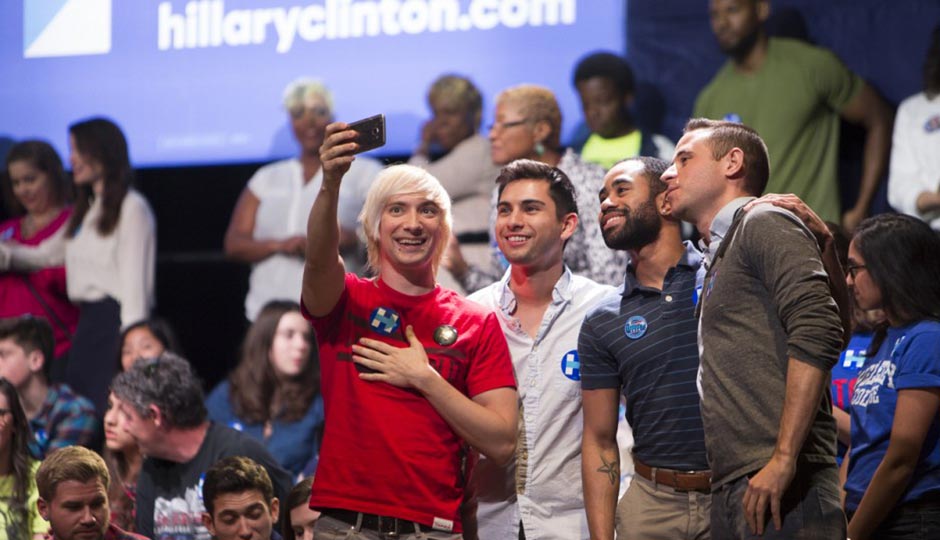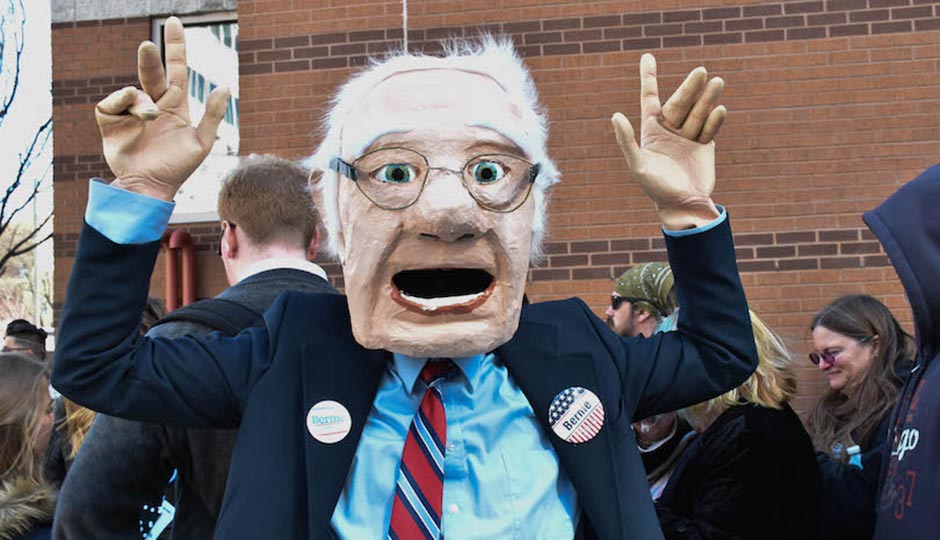Hey Philly: Are You All In for Hillary? Or Are You Feeling the Bern?

A Hillary Clinton supporter waits outside her April 20th rally at the Fillmore. Photo | Ryan Collerd
On the night of the Brooklyn Democratic debate, I head toward the South Philly field office of Bernie Sanders for President. The address takes me to a storefront with an enormous overhang bearing the name of the former tenant, Boutique W — a discount designer-clothing store based in Newtown Square — in pink and black lettering. It’s an odd sort of welcome sign for the grassroots, 99-percenter campaign, but then again, office space is office space and inside, the place looks more the part.
Young volunteers are passing around phone-bank lists like an aggressive game of Go Fish and chomping on Chips Ahoy during breaks. Folding tables are scattered with HP laptops and bottled water. There’s a garbage can humorlessly labeled “garbage.” And clipboards. Lots of clipboards. Everyone seems to believe that South Philly, perhaps more than any other neighborhood, is Feeling the Bern. I float to the back of the no-frills, white-walled space and chat with a shaggy-haired campaign worker who speaks on background (only volunteers can speak on the record, I was told). He nonetheless wanted to know: “Do you like Bernie?”
Two days before the Pennsylvania primaries, that question would seem a relevant one to ask of anyone and everyone in Philadelphia. Of course, it ignores the Republicans who’re also voting on April 26th (recent polling suggests Donald Trump has a double-digit lead in the state), but given the 7-to-1 edge in registered Democrats in the city and the upcoming DNC this summer, it seems right to focus on the blue team here. (Also: Liberal media bias, natch.)
But truth be told, writing any story about the Tuesday primary feels like an obligatory act of self-aggrandizement, considering the national consensus that our vote means zilch. “Why Pennsylvania won’t matter much in either primary,” ran a headline in the Washington Post on Thursday. Hillary Clinton is cruising, having locked up 81 percent of the delegates required to secure the nomination. And, thanks to the Dems’ lack of winner-take-all primaries and the omnipotent Clinton-friendly superdelegates, she can conceivably lose every single remaining state and still win by a comfortable margin. Not that she appears to be in any danger of that: Depending on which of the latest polls you believe, the former Secretary of State has a 13-point or 27-point lead over Sanders among likely primary voters in the Keystone State, where she beat Barack Obama by nearly 10 points in 2008.
Last time, the race felt neck-and-neck; in 2016, it’s a runaway. The wide berth is just one reason for the apathetic mood of lots of Philadelphians though. “I’m not supporting a broken system,” says Paris Adams, 19, a young man from Frankford who said he supports Sanders, but doesn’t see the point in casting a ballot. “Unless Captain America is running, I’m not voting.”
In ’08, voters like Adams were exactly the type — well-informed, African-American, eligible for the first time — that the Obama ground game famously turned out in droves. After an economic recession and eight years of gridlock in Washington though, voters appear to be a lot more jaded. A Pew analysis of a dozen primaries (including Super Tuesday) suggests that Democrat voter-turnout rates have been roughly 60 percent of what they were during Obama v. Clinton. The most optimistic spin is that turnout has not been cataclysmically bad. Dems are voting at higher rates this year than in 2000, sure, but they’re slightly off the pace of the average turnout since 1980. (And that average is excluding the outlying year of 2008.) The enthusiasm this year can be summed up in a single word: Meh.
Over the past 10 days, my conversations with a range of Philadelphians — including elected officials, campaign volunteers and strangers — confirmed the blasé mood. As did a relative dearth of campaign signs: On some blocks, I saw roughly an equal number of Obama-Biden posters, fading in window panes, as either Clinton or Sanders signage. Is that a harbinger of low turnout? Perhaps. A sign of danger for Dems in the general election? Not necessarily.
“I think a lot of Hillary supporters are thinking there’s no need to go running around now, because we have a general election coming up,” says Michael Howett, an interior designer who lives in Bella Vista. “In ’08, we were out on the street corners. This time around it hasn’t been much of a contest.”

Bernie Sanders supporters at a rally at Temple University. Photo | Mariam Dembele
Of course, if you’ve been following the election playing out locally, you’re probably wondering, What about the 10,000-plus people at the Liacouras Center for Bernie? Or the 2,000 people crammed into the Fillmore to see Clinton? Or the “Bernie Bae” music video? Or the protests invoking Black Lives Matter? Or the bay-window Clinton shrine in Howett’s Bella Vista home? Or the Bernie Bros and Clinton Cartel blowing up your Facebook feed, like, every single day, for the past six months? None of that qualifies as enthusiasm?
Well, it does. And maybe lawn signs aren’t even a good barometer of political fervor when there’s Facebook. But don’t confuse a loud social-media echo chamber with mass appeal. For all the talk of Sanders as a populist, his message doesn’t appear to have gotten out to swaths of Philadelphians. When I asked Ronnie Jordan, lounging on the steps of a home in Harrowgate, whether he’d considered Sanders, his answer was revealing (and not unique): “No, I’m a Democrat” — the same answer he gave when dismissing Donald Trump. On the other hand, Clinton’s name recognition dating back to the ’90s won over Jordan. “She knows the ropes, and Bill [Clinton] will be right there beside her,” he says.
The local political class has done Sanders no favors. Philly Dems were split in their endorsements in 2008, and some took flack for supporting Obama. Only one member of the Washington and Harrisburg delegations has gone against the grain this year: State Senator Arthur Haywood. “Bernie Sanders has an uphill battle because he’s a lot less well-known,” says Haywood, who represents a district spanning parts of Montgomery and Philadelphia counties. “I thought it was important to shake up the conversation that he doesn’t have African-American support — which he does have. Not as much as Clinton, but he does.”
The perception of Sanders’ base being milky white was just one of many stereotypes I was curious about investigating. So I got in touch with both presidential campaigns, in hopes of shadowing some canvassers. Sanders’ regional press secretary, Greg Minchak, flatly rejected the idea, explaining that I would be corrupting the purity of the canvassing process by having a reporter peering into homes. So my consolation prize was to hang with folks from the South Philly HQ as they noshed on chips and dip during a debate watch party across the street at Tex-Mex dive Adobe Cafe.
Outside, I bump into Bill Comer, an AARP-eligible Bernie supporter who was brimming with opinions on just about everything: Supermarkets (big fan of Aldi’s corporate culture, not so much of ShopRite), SEPTA (thumbs up on articulated trolleys) and of course, Madam Secretary (“She’s a phony!”). The issue of Clinton’s trustworthiness — or lack thereof — resonated with a lot of Sanders voters I spoke with. “I know she lied about Benghazi!” yelled one woman who went by Teresa, in East Passyunk. Although later she came back to college affordability and the $15 minimum wage as important policies, her anti-Clinton streak was more palpable than her belief in Bernie.
When the next person arrives at Adobe with a Bernie button — Michelle Loucas, a teacher at the Philly Free School — Comer starts doing my job for me:
Comer: What neighborhood are you from?
Loucas: I’m right up the street at 8th and Wharton.
Comer: What do you think? If it weren’t for Bernie, would you have voted straight Democrat for Hillary?
Loucas: No way! Not a chance, are you kidding me! No, I’d be voting for Jill Stein. [I’ll save you the Google. She’s the Green Party candidate.]
Loucas proceeds to talk about how she’s exceedingly frustrated that Clinton is riding President Obama’s coattails in stump speeches. “We should drink every time she drops his name.” (During the debate, rallying cries for said drinking game were largely ignored. So, too, were organizers’ repeated attempts to hock the questionably titled drink specials: the Grumpy Progressive and Feel the Bern Margarita.)

Millennial Hillary Clinton supporters pose for a selfie, naturally, at Clinton’s April 20th Fillmore Rally. Photo | Ryan Collerd
John Scott, the 25-year-old volunteer who sat next to me, also expressed a distrust of the former Secretary of State. “Bernie is like a beautiful grandfather,” he says. “I feel there’s nothing dishonest about him.” This is Scott’s first time getting involved in a presidential campaign. He’s been carrying his giveaway buttons in a rectangular case he’s papered over to read: Box of Optimism. I ask him how the canvassing is going. “The South Philly Hillary supporters, in my experience, are easily swayed,” Scott says. “Especially when you challenge the fact that she’s a woman.” What he means to say is that he’s noticed a lot of Clinton supporters are engendered by gender, saying they’re voting for her based on the historicity of her campaign or the assumption that she understands — and will fight for — women’s rights better than Bernie.
Frankly, I heard this claim a lot from Bernie acolytes — framing Clinton supporters as single-issue voters — a charge which at best felt overblown, and at worst felt patently false. At the Clinton rally in Fishtown, I met a fourth-grader named Hooria — who played hooky from school (with her father as an accomplice) to get in line early — and even she, a 10-year-old, had more nuanced opinions about supporting Clinton than just an XX chromosome. “I think she’s a good person and I also like her personality,” she says. Eventually, several points down the list, she adds, “I want to see the first female president.”
Exit polls in other states have suggested that identity politics are playing a role, albeit a limited one, in Clinton dominating the non-millennial female vote. The fact that the former Secretary of State’s detractors can even make the accusation is notable, given that Clinton was heavily criticized for downplaying her sex in ’08. “After running as a man last time around, Hillary Clinton is now running as a woman,” Maureen Dowd wrote in a column this January.
“It is a great line for the Sanders campaign or any opposition to frame Hillary supporters voting for her as a woman,” says Clinton enthusiast Ben Stango, who’s been one of the organizers of a young-professional fundraising group in Philly. “It’s not only about having a woman in office or a Secretary of State in office, it’s about having someone who is the smartest person in the room. The Sanders campaign is doing a disservice to the party by saying that it’s a woman thing.”
When I went knocking on doors with a canvasser in Chestnut Hill (oddly enough, the Clinton campaign had zero problem with it), the candidate’s gender came up sparingly. I’d been partnered up with Janice Winston, a buoyant, 60-something Democratic committeewoman from Mount Airy who wore a jean jacket, hoop earrings and bright lipstick. Two of her big issues are gun violence and healthcare, having lost her son to cancer in the mid-’90s. “When I saw her talking about universal healthcare in’93, ’94, ’95 — that still resonates with me. She was ahead of the curve,” says Winston.
Moments later, a woman honks her car horn in solidarity and yells “I’m so sick of Bernie!” before speeding away, cackling like a cartoon villain. The sentiment is repeated soon after by a grey-haired woman sitting outside Tavern on the Hill who detests Sanders. “[Bernie] is on a power trip because all these young kids are screaming his name,” she says.
Though the race might not be contentious in terms of the delegate count, there’s plenty of mutual disdain from diehards on both sides. But even the reductive mud-slinging is relatively tame compared to ’08. “Last time it was truly chaotic,” says state senator Shirley Kitchen, who represents a large stretch of North Philly and has endorsed Clinton this year. “I think it was worse then, because some of the big-name Democrats would talk in racial terms.” Both Clinton and Obama were caught up in controversies related to racially coded remarks, including Obama’s dig at rural Pennsylvanians who “cling to guns and religion.”

A Sanders supporter in a giant Bernie mask outside the Temple rally. Photo | Mariam Dembele
Some of the stereotypes did hold true. The scruffy, 30-something South Philly guy nursing a noontime Kensinger in one hand and a cigarette in the other — he was unequivocally going for Bernie. Several members of the Chestnut Hill nouveau riche were going for Clinton in part because they feared what’d happen to their IRAs with a break up of Wall Street banks. But there were other assumptions that seemed superficially inflated.
There’s been a narrative that most of Sanders supporters are predominately Millennial white dudes who used to frequent punk shows and never quite got over their teenage sexual angst — and now they’re all up in your face on social media tearing apart theories as to why Sanders’s free-college-tuition plan won’t work. Yes, the Bernie Bros. They do exist, but I found the stereotype to be a minority of the supporters I spoke to. Of the young people of color I spoke to — lots of whom stressed criminal justice as a chief concern — they were just as likely, if not more likely, to swing toward Sanders.
Talk to supporters in the other camp, they’ll also tell you there’s a myth being perpetrated on the public: youth enthusiasm being non-existent amongst the Clinton cohort. “Maybe it’s been the sexier story to report on, that the underdog is winning a next-generation demographic,” says Dan Kessler, a Hillary finance committee member. “I’ve hosted events across the country, and anecdotally, we’ve seen young people come out in the thousands in support of her and I haven’t seen one piece on that.”
At the Fillmore last Wednesday, everyone — Clinton included — spoke as if the general election had already begun. The pivot away from worrying about Bernie Sanders, and toward the Republican electorate, was palpable in her speech. And on my way home, my cab driver pointed to the challenge ahead for the Democrats. My cabbie — a Nigerian immigrant — said he’ll be voting for GOP frontrunner Trump, even though he doesn’t care for Trump’s outlandish promises, aside from squelching terrorists (which he likes). He’s supporting Trump because he’ll be the most fun in office.
Your vote on Tuesday may not matter much, but just wait until November.
Follow @MalcolmBurnley on Twitter.


